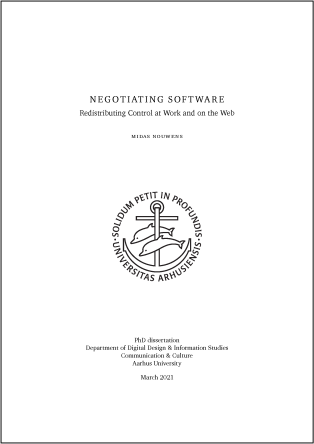Negotiating Software: Redistributing Control at Work and on the Web
Keywords:
negotiation, data protection, software application, consent pop-ups, mediated labourSynopsis
Since the 1970s, digital technologies increasingly determine who gets what, when, and how; and the workings of informational capitalism have concentrated control over those technologies into the hands of just a few private corporations. The normative stance of this dissertation is that control over software should be distributed and subject to processes of negotiation: consensus-based decision making oriented towards achieving collective benefits. It explores the boundaries of negotiating software by trying to effect a change in two different kinds of software using two different approaches.
The first approach targets application software – the paradigmatic model of commodified, turn-key computational media – in the context of knowledge work – labour that involves the creation and distribution of information through non-routine, creative, and abstract thinking. It tries to effect change by developing negotiable software as an alternative to the autocratic application model, which is software that embeds the support for distributed control in and over its design. These systems successfully demonstrate the technological feasibility of this approach, but also the limitations of design as a solution to systemic power asymmetries.
The second approach targets consent management platforms – pop-up interfaces on the web that capture visitor’s consent for data processing – in the context of the European Union’s data protection regulation. It tries to effect change by employing negotiation software, which is software that supports existing processes of negotiation in complex systems, i.e., regulatory oversight and the exercise of digital rights. This approach resulted in a considerable increase in data protection compliance on Danish websites, but showed that sustainable enforcement using digital tools also requires design changes to data processing technologies.
Both approaches to effecting software change – making software negotiable and using software in negotiations – revealed the drawbacks of individualistic strategies. Ultimately, the capacity of the liberal subject to stand up against corporate power is limited, and more collective approaches to software negotiation need to be developed, whether when making changes to designs or leveraging regulation.

